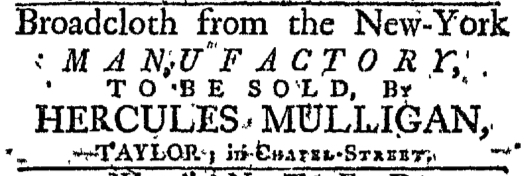What was advertised in a colonial American newspaper 250 years ago this week?

“Broadcloth from the New-York MANUFACTORY.”
At the same time that Enoch Brown was placing advertisements addressed to “those Persons who are desirous of Promoting our Own Manufactures” in multiple newspapers published in Boston, shopkeepers and artisans in other cities placed their own notices to promote “domestic manufactures” over imported goods. In the September 15, 1768, edition of the New-York Journal, for instance, several advertisers offered alternatives to the merchandise that competitors had imported in ships from London and other English ports.
Hercules Mulligan offered the starkest of these advertisements. In its entirety, it announced “Broadcloth from the New-York MANUFACTORY, TO BE SOLD, BY HERCULES MULLIGAN, TAYLOR, in CHAPEL-STREET.” In contrast, Samuel Broome and Company listed more than a dozen textiles “imported in the Mercury, from London, and the last Vessels from Bristol, Liverpool, and Scotland.” Similarly, an advertisement for “WILLIAMS’S STORE” once again underscored “the greatest variety and newest patterns; lately imported in the last ships.” These advertisements resorted to popular appeals, an explicit appeal to consumer choice and implicit appeals to fashion and quality through invoking the origins of the textiles. Given the political atmosphere in 1768, especially the movement to boycott British goods in the wake of the Townshend Acts, Mulligan did not consider it necessary to be any more verbose than simply proclaiming that he sold locally produced fabric at his shop.
In addition to Mulligan’s notice, the supplement to the September 15 issue featured two advertisements that had been running since July, one for the New-York Air Furnace Company and another for the New-York Paper Manufactory. The former hawked “a large Assortment of the following cast Iron Ware, which is allowed by proper Judges to be equal, if not superior to any made in Europe or America.” It then listed dozens of items that consumers could choose over those enumerated in advertisements by Broome and Company, Williams, and others. The latter made an unequivocal appeal related to current conversations about politics, commerce, and the colonies’ relationship with Britain. In it, John Keating advised “All those who have the Welfare of the Country at Heart … to consider the Importance of a Paper Manufactory” to the New York colony.
John Facey, a brushmaker from Bristol, was not as bold in his advertisement for the many different sorts of brushed he made and sold, but he did state his hope that “the gentlemen both in town and country will encourage the brush manufactory.” Readers of the New-York Journal certainly encountered familiar advertisements for imported goods, but as the imperial crisis intensified they also increasingly found themselves presented with alternatives. A growing number of advertisers launched “Buy American” campaigns before shots were fired at the Boston Massacre or the battles at Lexington and Concord.
